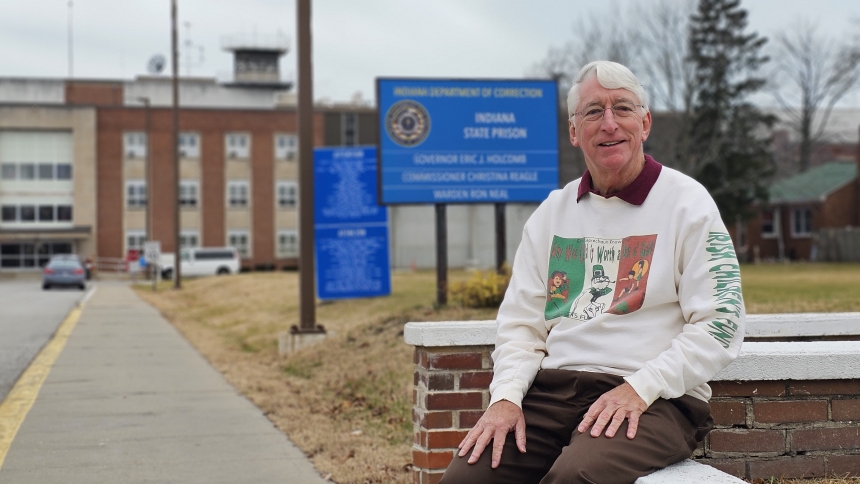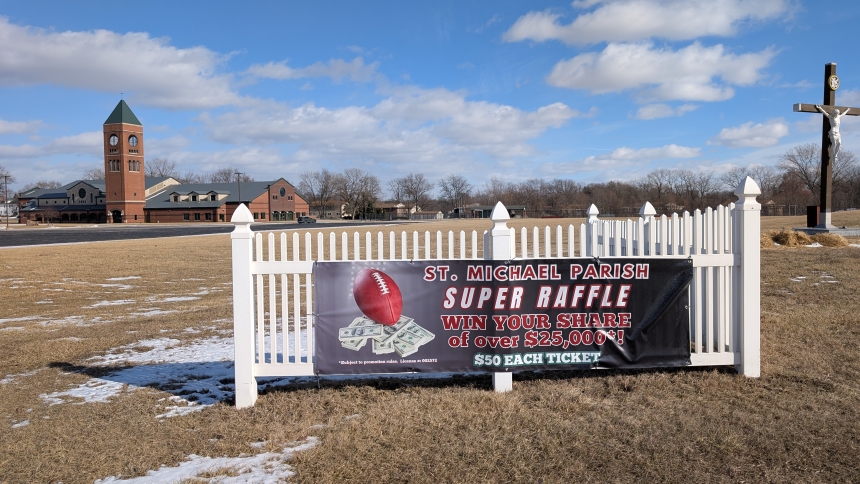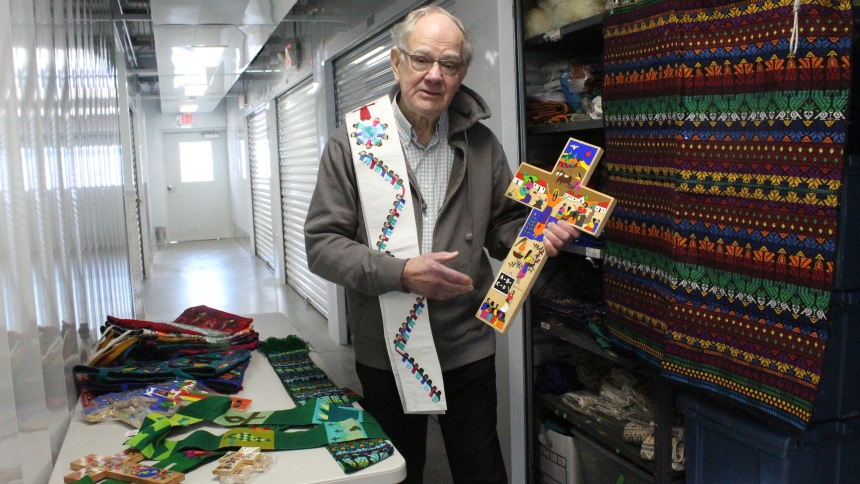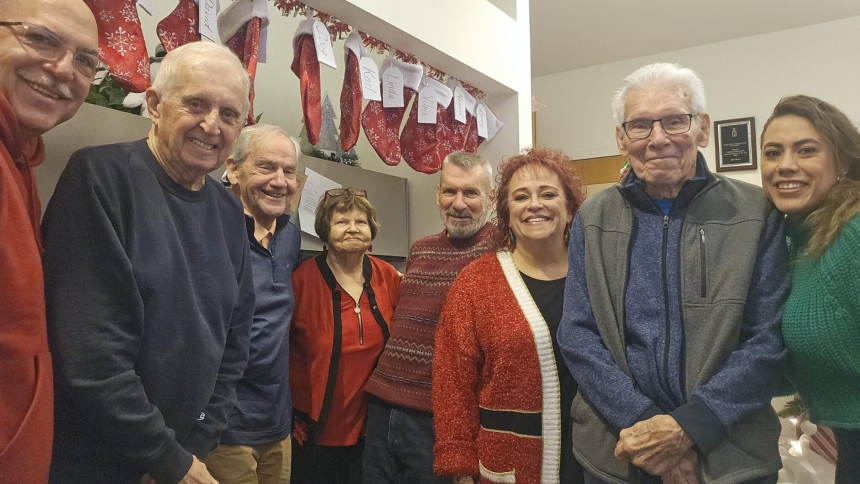
MUNSTER – There aren’t many people who prison inmates trust, but at the Indiana State Prison in Michigan City, Deacon Mike Prendergast is at the top of the list.
Experience and authenticity are the key elements of that trust, and the head of the Diocese of Gary’s Prison Ministry for the past 23 years does not take that for granted, he told the “Live Christ, Share Christ” prayer group at St. Thomas More as its guest speaker last month.
“When they ask, I’ll take time with them,” nodded the deacon, who visits the prison every Sunday and stays after Mass to meet individually with the “guys,” as he calls them, who are in lockdown for a variety of reasons and can’t attend Mass.
“A few of us over the years have gone through training and don’t need an escort, or ‘blue badge,’ to move through the jail sections,” Deacon Prendergast explained. “Some guys are in for life – they may have already been in prison for 40 years, or they may be on death row, although that doesn’t always mean they will be executed.
“I try to do something for them, get their sentences reduced, or write letters of recommendation based on my experience with them,” he added. “I ask them to tell me what they’ve done while in prison. Sometimes I can tell them, ‘I’ve been here 23 years, longer than you have.’ Beneath the rough exterior is a warm and caring heart.
“Maybe a guy sees that another guy is comfortable with me, and so he asks me to stop by ‘17,’ and I do,” said the deacon. “The system is tough (but sometimes) they find Jesus, they really do. They don’t have anyone (else).”
Deacon Prendergast’s previous career may have something to do with how well he understands the “guys” inside the Michigan City prison, since he used to help incarcerate them as a Federal Bureau of Investigation agent for 34 years. He lobbied in Indianapolis for a state law to attach a specific number of years to a “life” sentence, and is disappointed in the lack of rehabilitation inside prisons.
“We warehouse people because they did something bad, but there is no rehabilitation,” he said.
Before he retired in 2011, he was ordained in the first class of new deacons in 2000 from St. Elizabeth Ann Seton in Valparaiso and even before ordination he began working in the prison, Westville Correctional Center and local county jails. “I was chosen (among the deacons) to head the Prison Ministry because of my personality and law enforcement background,” he said. “My mentor was the late Deacon Joe Codespoti, who worked with me in the ministry. I started coming to the prison for the Sunday Mass, and then offered to work with the guys in lockdown, too.”
Deacon Prendergast admitted he is questioned about his passion for those who are incarcerated, but finds it important to his commitment to missionary discipleship. “People say, ‘You go to visit men on death row!’ They have been sentenced to die, but their reason for being there doesn’t matter to me,” he said. “I work with prosecutors – I can’t go to a judge – to help these guys.
“My time out there with the guys may be exhausting, but it is exciting,” he added. “People may say, ‘In 1977 he killed three people,’ but I tell them, ‘You don’t know anything about this guy now. It has been 45 years, and things happen in prison.
“There is jealousy, power, security and status (among the issues in prison), but when they ask, I’ll take time with them, try to do something for them.”
While there are currently no diocesan priests participating in the Prison Ministry, Sunday Mass is celebrated by one of the Legionnaires of Christ serving at Sacred Heart Apostolic School in Rolling Prairie. “I am also helped by priests among the doctoral students at (the University of) Notre Dame and Holy Cross priests at the university when needed.
“We have about 80 guys who come to Mass every week, not always the same ones, but the fact that you come and are willing to participate, some guys for years … some will say, ‘I’m thinking about becoming Catholic. I check their records to make sure they haven’t already been baptized, and if not, I don’t deny anyone. At least they are trying to form some community within that oppressive system,” said the deacon, who believes all diaconate candidates should be exposed to the Prison Ministry while in training.
“They need (that experience), whether or not they are interested. Eight candidates are helping out at Michigan City now,” Deacon Prendergast added. “They may be scared to come out, but they find that the guys there are just people. You have to be open to what they are telling you, to listen.
“Will they ask you to do things you can’t do? Oh sure, they make attempts, but that’s when your fortitude comes in,” he said.
“This ministry grows on you, is really rewarding,” said the deacon, who got emotional when describing a card some of the prisoners gave him after he asked them to pray for his daughter, who was struggling with an addiction at the time. “The card wasn’t for me, it was for her, to encourage her to get better. They cared about her and continued to ask me about her and offered support. That’s who I deal with,” he added.
“The few minutes we have with these guys, it brings peace to them,” said Deacon Prendergast, who was banned from visiting the prison during the COVID-19 pandemic. In working later to regain visitation privileges, the deacon said he told prison administrators, “You need to allow me to have access; I am willing to commit to them. I’ve never been afraid to go inside.”
Another component of the Prison Ministry is the Prison Clothing Ministry headed by Charlotte Rosta, of St. Elizabeth Ann Seton, also Deacon Prendergast’s parish. A prison volunteer since 2000, she started collecting clothing in 2003, when she learned that the men were released with inadequate clothing – flip-flops, torn pants and shirts and no coats.
She “made a promise to God” that when the men were released, “we would meet them with (a set of decent) clothes to help them start a new life.” Rosta said in an earlier interview. “I thank all the parishes who help. They bring us clothing donations and I have a room to store them at our parish. We also receive monetary donations, and we have received two grants from the diocese.”
Before men get released, Deacon Prendergast said, they can fill out a form with their sizes, and Rosta and other volunteers prepare a duffle bag with jeans, shirts, shoes, underwear, socks, and jackets that is taken to the prison by the deacon “hopefully a couple of weeks before their release date, just in case it is changed,” he explained.
The deacon asked his audience not to forget about the clothing ministry, which accepts new and gently-used clothing, especially larger sizes, duffle bags and cash donations to purchase new underwear and other needed items. Call the parish office at 464-1624 for more information about making a donation.
“Keep all of us in the Prison Ministry in your prayers, and keep the guys inside in your prayers. “They appreciate it,” Deacon Prendergast asked.
“Out of all the sadness (in prison), his is a ministry of joy,” noted Deacon Napoleon Tabion, who serves at St. Thomas More.



